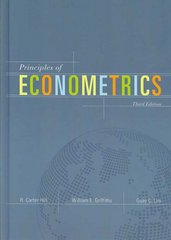Answered step by step
Verified Expert Solution
Question
1 Approved Answer
Commuter trains often have quiet cars in which passengers are expected not to play music or engage in loud conversations. An opinion poll that asked
Commuter trains often have "quiet cars" in which passengers are expected not to play music or engage in loud conversations. An opinion poll that asked whether airline passengers reclined their seats found that "half of respondents recline half the time or more, half of respondents do it once in a while or never." Consider two possible ways that airlines might deal with the externality caused by reclining a seat:
i Make all seats so that they cannot be reclined.
ii Have ano reclining" section on each flightsimilar to the quiet cars on commuter trains in which passengers would not be allowed to recline their seats.
Sources: Benjamin Freed and Elaina Plott, "How to Not Get Yelled at in the Acela's Quiet Car," washingtonian.com, May; and Walt Hickey, Percent of Fliers Think You're Rude if You Recline Your Seat," fivethirtyeight.com September
Part
Would either of these changes be likely to result in an economically efficient outcome? Briefly explain.
A
Neither option would result in an efficient outcome because passenger preferences not only differ, but differ on each flight. The costs to some from reclining their seats will likely exceed the benefits they impose on others so that having only nonreclining seats would not be efficient. Furthermore, it is unlikely that the number of seats in any nonreclining section will be exactly the same as the number of people for whom the costs of nonreclining seats exceed the benefits.
B
Having only nonreclining seats would not result in an efficient outcome because for some, the cost of a reclining seat is less than the benefit to the person who reclines their seat. However, having ano reclining" section on each flight would always result in a socially efficient outcome because those who seriously object to having the seat in front of them recline could choose to be in that part of the plane, while those who want to recline their seator who don't care if the seat in front of them is reclined could choose to be in the other section.
C
Having only nonreclining seats would result in an efficient outcome because all passengers would be treated equally. For the same reason, having ano reclining" section on each flight would always result in a socially inefficient outcome because it is unfair to treat people differently.
D
Neither option would result in an efficient outcome because passenger preferences not only differ, but differ on each flight. The benefits to some from reclining their seats will likely exceed the costs they impose on others so that having only nonreclining seats would not be efficient. Furthermore, it is unlikely that the number of seats in any nonreclining section will be exactly the same as the number of people for whom the benefits of nonreclining seats exceed the costs.
Step by Step Solution
There are 3 Steps involved in it
Step: 1

Get Instant Access to Expert-Tailored Solutions
See step-by-step solutions with expert insights and AI powered tools for academic success
Step: 2

Step: 3

Ace Your Homework with AI
Get the answers you need in no time with our AI-driven, step-by-step assistance
Get Started


